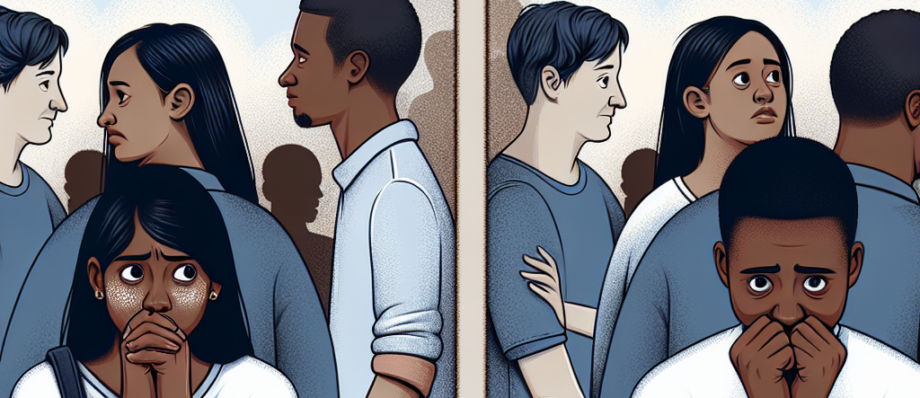Understanding the Difference Between Social Anxiety Disorder and Shyness
Is it just shyness or something more serious? If you’ve ever felt a knot in your stomach before a social event, you’re not alone. Many people grapple with apprehension when interacting in social settings. However, not all social discomfort is created equal. Let’s dive into the nuances of social anxiety disorder and shyness, shedding light on their differences, and how you can find your way to a more confident self, particularly through online therapy.
What is Shyness?
Shyness is a common experience. We’ve all had moments where we feel a little shy. Perhaps you recall that awkward pause during introductions at a party, your hands clammy and your heart racing. Shyness usually arises in new situations or among unfamiliar people. It’s like a protective layer that keeps you comfortable, but it often fades with familiarity.
In many cases, shyness doesn’t hinder daily life or mental well-being significantly. For instance, I remember attending a networking event where I didn’t know a soul. Initially, I felt like a wallflower, but as I struck up conversations with a few participants, my confidence started to build. By the end, I’d even exchanged contact information with several people! That’s the essence of shyness—it can be overcome with time and practice.
What is Social Anxiety Disorder?
On the flip side, social anxiety disorder (SAD) is more than just feeling out of place; it’s a mental health condition that can impose significant limitations on one’s life. Imagine waiting for a phone call from your boss, constantly worrying about being judged or embarrassing yourself, even in ordinary situations. That’s the daily struggle individuals with social anxiety face.
People with social anxiety tend to avoid social interactions altogether, fearing humiliation or negative evaluation. This avoidance can greatly impact work, relationships, and overall quality of life. Personal experience has taught me the depth of this struggle. For years, I missed out on gatherings, convinced that everyone would be critical of my every word or gesture. This isolation deepened my anxiety, creating a vicious cycle.
Comparing Shyness and Social Anxiety Disorder
Understanding the difference between general shyness and social anxiety disorder can help clarify what you or someone you know might be experiencing. Consider the following comparisons:
-
Intensity:
- Shyness: Generally mild, temporary feelings of discomfort.
- Social Anxiety Disorder: Chronic and intense fear that feels overwhelming.
-
Impact:
- Shyness: Social situations may be daunting, but manageable.
- Social Anxiety Disorder: Fear often leads to avoidance, affecting personal and professional opportunities.
-
Duration:
- Shyness: Often situational, fading with time or exposure.
- Social Anxiety Disorder: Persistent, lasting six months or more and causing significant distress.
- Cause:
- Shyness: Typically situational, rooted in personality or environment.
- Social Anxiety Disorder: Often tied to deeper issues such as genetics, brain chemistry, or past experiences.
Coping Strategies for Shyness
If you find yourself simply dealing with shyness, several strategies can help ease your discomfort:
- Practice small talk in low-pressure settings.
- Engage in activities you enjoy to meet like-minded individuals.
- Set small social goals, gradually increasing the challenge.
Addressing Social Anxiety Disorder
If what you experience feels more like social anxiety disorder, it’s crucial to seek support. Here are some constructive steps to consider:
- Recognizing your feelings: Accepting that what you experience is valid is the first step towards healing.
- Seeking online therapy: This modern approach allows for a flexible and comfortable setting to explore your emotions without the pressure of face-to-face interactions.
Online therapy offers numerous benefits, such as:
- Access to skilled professionals specialized in social anxiety
- The comfort of connecting from home
- Flexible scheduling that fits your lifestyle
You don’t have to navigate this journey alone. Start taking positive steps toward overcoming social anxiety by exploring online therapy options here: Social Anxiety Treatment. Taking that first step can be transformational!
Building Confidence and Community
Whether you’re dealing with shyness or social anxiety disorder, remember that change is possible. Finding the right support, be it through online therapy or connecting with understanding friends, can make all the difference.
Reflecting on my journey, I remember the day I decided to join a local art class. Surrounded by fellow beginners, I soon discovered that many shared similar feelings. The experience was a game-changer, helping me cultivate relationships and ultimately building my confidence.
Final Thoughts
Shyness may cause momentary discomfort, but it typically doesn’t inhibit living a fulfilling life. On the other hand, social anxiety disorder demands attention and understanding. With the right resources and support, including online therapy, it’s entirely possible to step into the social world with renewed confidence.
If you or someone you care about is navigating social anxiety, remember: you are not alone. Every small step counts towards crafting a life filled with connection and joy. Embrace the journey, and consider taking a moment today to explore opportunities for growth and healing.
Let’s banish those social worries together! 🌈
Disclosure:
Hospitals.net is a participant in the Amazon Services LLC Associates Program, an affiliate advertising program designed to provide a means for sites to earn advertising fees by advertising and linking to Amazon.com, .ca, .co.uk, etc.
AI Disclaimer:
Hospitals.net uses artificial intelligence (AI) tools to assist in gathering and summarizing product information, including reviews and other relevant data for Amazon products and services. While we strive to ensure the accuracy of the information provided, AI-generated content may not always reflect the most up-to-date or accurate details. The information on our site should not be considered professional advice, and users are encouraged to verify any product details directly with Amazon or other official sources before making a purchase.
We do not guarantee the completeness or accuracy of the AI-generated content and are not liable for any discrepancies or errors. Any reliance on the information provided is at the user’s own risk. By using this site, you acknowledge that product availability, pricing, and other details may change over time, and Hospitals.net is not responsible for these changes.
Health Disclaimer:
The health products and information provided on Hospitals.net are for informational purposes only and are not intended to substitute professional medical advice, diagnosis, or treatment. Always consult a qualified healthcare provider or medical professional before using any health products or following any advice you find on this site. The content on Hospitals.net, including product recommendations and reviews, is not a substitute for individualized care from a healthcare provider.
We make no warranties or representations regarding the effectiveness, quality, or safety of the products listed on our site. Any use of these products is solely at your own risk. Hospitals.net is not liable for any harm, injury, or adverse effects that may result from the use or misuse of the health products or information provided.
Please read all product labels, warnings, and directions provided by the manufacturer before using any product. If you have any questions about a product or its suitability for your condition, we recommend contacting the manufacturer directly or consulting a healthcare professional.
If you have any concerns regarding the accuracy of the information on this site, please contact us for further clarification.



